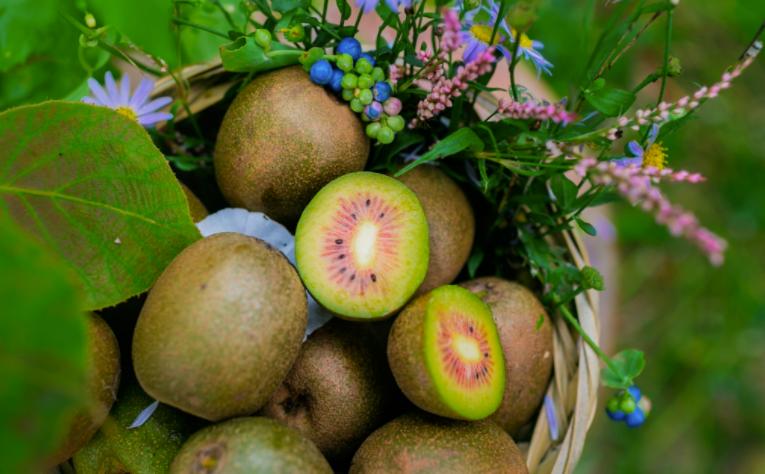
When it comes to fruits named after animals, everyone will definitely think of kiwifruit. This name will make some people think that it is called kiwi because it has hair on its surface and looks like a kiwi. But in fact, the truth is that the name is derived from the macaque monkeys like to eat this fruit. Li Shizhen recorded in the "Compendium of Materia Medica": "Its shape is like a pear, its color is like a peach, and the macaque monkey likes to eat, so it has various names." "Kiwifruit also has many aliases, such as vine pear, yang peach, sheep peach, white peach, hair pear and so on. It was not called kiwi fruit at the beginning in ancient times, it was called Cangchu in the Book of Poetry and Erya, and the Tang Dynasty poet Cen Shan's poem "Taibai Dongxi Zhang Laoshe Is The Matter of Sending Her Brothers and Nephews" can be seen in the sentence "On the atrium well, a kiwi fruit", indicating that the name of this kiwi fruit is likely to have begun in the Tang Dynasty.
Kiwifruit is not a peach, and both families are different. Kiwifruit is a kiwi in the family Kiwi family Kiwi, while peach is a plant of the genus Rosaceae.
Kiwifruit was originally native to China, but for a long time it was naturally grown as a wild fruit, until the beginning of the last century, kiwi seeds were brought back by New Zealanders who came to China for extensive cultivation, which turned into a well-known fruit.
Although it has not been widely cultivated as a fruit for a long time, its history as a traditional Chinese medicine can be traced back to the Tang Dynasty. Cui Yuxi's Food Classics record that he: "He Zhong'an Liver. Lord jaundice, quench thirst". The Dietary Therapy Materia Medica records that it "takes the rice and frys it with honey, removes the heat, and quenches the thirst". It is recorded in the "Materia Medica" and the "Kaibao Materia Medica". Not only does Chinese medicine use its fruit, but its roots can also be used in medicine.
Autumn and winter gas is relatively dry, kiwi fruit can be clear and moist, especially children are prone to lung fever, fire and other situations, at this time to eat kiwi fruit is more appropriate. In modern nutrition, the nutritional value of kiwifruit is also one of the best, and it has the reputation of "the king of vitamin C". Vitamin C helps to improve various skin problems and antioxidants, so regular consumption of kiwifruit rich in vitamin C can beautify the face. In addition to vitamin C, kiwi fruit also contains a variety of amino acids and minerals and trace elements, its nutritional composition is comprehensive, high content, far more than other fruits. Children's consumption can help improve their body's immunity, promote the body's absorption of iron and calcium, and avoid and improve iron deficiency anemia.
In particular, kiwi fruit contains a less common ingredient in other fruits, folic acid. Folic acid is a water-soluble B vitamin, which plays an important role in the division and growth of cells and the synthesis of nucleic acids, amino acids and proteins, and is an indispensable nutrient for fetal growth and development, and folate deficiency in pregnant women may lead to low body weight, cleft lip and palate, heart defects and so on. And each kiwi fruit can provide a sufficient amount of folic acid, so kiwi fruit is a good nutritious food for women of childbearing age.
For people who want to maintain a good body, because kiwi fruit is rich in dietary fiber, low calories, and a strong sense of fullness, it can help digestion and prevent constipation, so you can eat with confidence and do not have to worry about gaining weight.
Source: China Traditional Chinese Medicine News